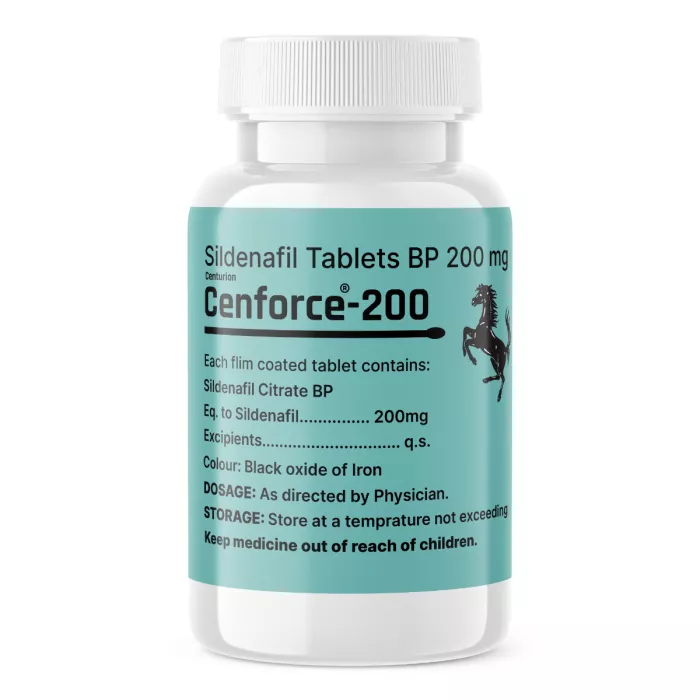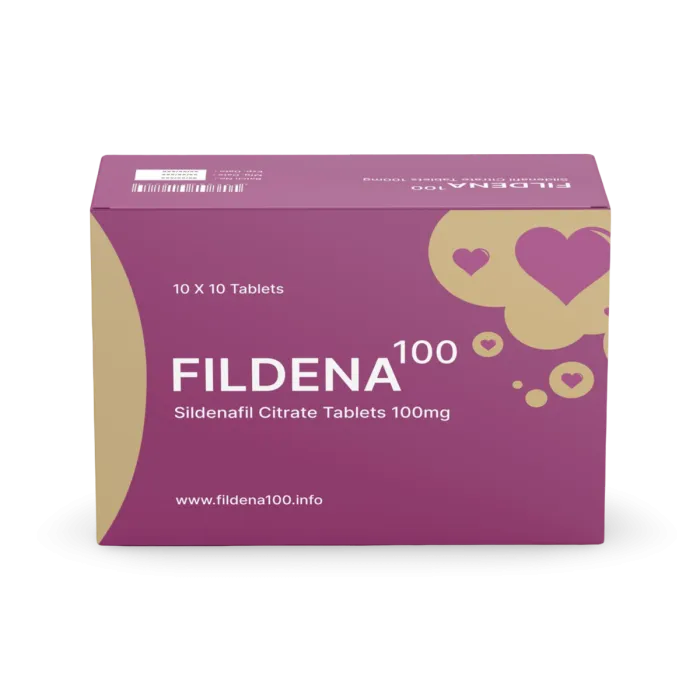Sildenafil, the active salt in Viagra, has transformed the world of male sexual health since its introduction in the late 1990s.
Originally developed as a heart medication, it quickly gained recognition for its unexpected yet life-changing impact of restoring erectile function and confidence to millions of people worldwide.
It is a prescription medication that works by improving blood flow, making it one of the most reliable remedies for Erectile Dysfunction (ED). Beyond sexual health, it is also used to treat Pulmonary Arterial Hypertension (PAH), highlighting its broader medicinal significance.
In this article, we’ll learn more about Sildenafil, its working mechanism, uses, side effects, and more such information regarding this medication to help you make safer and more informed health decisions.
What is Sildenafil used for?
Sildenafil is an FDA-approved Phosphodiesterase Type 5 (PDE5) inhibitor prescribed to treat Erectile Dysfunction in males. It is a condition in which males struggle to get or sustain an erection for a satisfying sexual encounter.
The medicine enhances blood supply to the penis, restoring normal erectile function in response to sexual stimulation, providing both physical and psychological advantages.
Besides ED, this medication is also sold under the brand name Revatio for Pulmonary Arterial Hypertension (PAH), a serious medical condition characterized by high blood pressure in the lungs. By decreasing blood pressure inside the lung’s arteries, it increases exercise capacity, and potentially delays disease progression.
Sildenafil is available in several forms, including oral tablets, chewable tablets, and oral jelly. These multiple formulations allow you to choose the option that best fits your preferences, lifestyle, and medical needs, ensuring both convenience and effectiveness.
Save up to 90% on your medicine bills

Cenforce 200 mg

Kamagra Oral Jelly Rx 100 mg

Fildena 100 mg

Vidalista 60 mg
Off-label uses of Sildenafil
Sildenafil uses are not limited to its approved roles in ED and PAH; it also has the following off-label uses that highlight its broader medical potential:
- Raynaud’s Syndrome: It is a vascular condition where fingers and toes become freezing, painful, and discolored due to limited blood flow during stress or exposure to cold. By relaxing blood vessels and boosting circulation, this medication effectively lowers the frequency and intensity of these episodes. This, in turn, provides comfort to individuals with severe or treatment-resistant cases.
- Altitude sickness: Another promising use of this tablet is the avoidance of consequences from altitude sickness, particularly High-altitude Pulmonary Edema (HAPE). It is a potentially fatal health condition caused by elevated blood pressure in the lungs at high altitudes.
- Female Sexual Arousal Disorder (FSAD): Research has examined the role of Sildenafil in treating Female Sexual Arousal Disorder, where reduced genital blood flow contributes to sexual difficulties. By increasing circulation, the medication may boost sensitivity and arousal in some women, although findings are mixed and further research is needed.
How does it work?
As a PDE5 inhibitor, this medicine works by enhancing blood flow to the areas of the body where it is needed. Let’s see how the medication works for ED and PAH.
Working for ED
The medication treats ED by improving the natural mechanism that causes an erection. When sexually stimulated, the body produces Nitric Oxide (NO), which raises levels of cyclic Guanosine Monophosphate (cGMP). It is a naturally occurring substance that relaxes smooth muscles in the blood arteries of the penis.
This relaxation enables more blood to flow into the penis, causing an erection. Usually, the enzyme PDE5 breaks down cGMP, limiting blood flow and ending the erection. The medication inhibits PDE5, which prevents the breakdown of cGMP and maintains higher concentrations in the penis.
As a result, it assists men in obtaining and maintaining an erection, but it only acts in response to sexual stimulus; it does not generate arousal on its own.
Working for PAH
PAH develops when the arteries constrict or harden, causing the heart to work more to get blood through the lungs. This increased workload often causes shortness of breath, fatigue, chest discomfort, and a reduced ability to exercise. For PAH, this PDE5 inhibitor acts by relaxing the blood vessels inside the lungs, lowering the high blood pressure within the pulmonary arteries that supply blood to the lungs.
Blocking the PDE5 enzyme, this salt raises cGMP levels in the same way as it does in ED. This method decreases blood pressure inside the lungs, improves oxygen supply, increases exercise capacity, and delays disease progression. This, in turn, enhances the quality of life for PAH patients.
Sildenafil dosage, timing, and administration
Sildenafil’s dosage, timing, and method of administration differ depending on whether it is used to treat Erectile Dysfunction or Pulmonary Arterial Hypertension. Let’s have a look at these features for both conditions.
For ED
For ED, this oral PDE5 inhibitor is usually prescribed at a starting dose of 50 mg. However, it can be adjusted to 25 mg (lower dose) or 100 mg (maximum dose) based on individual response and tolerance.
It is taken 30 to 60 minutes before planned sexual activity and is most effective on an empty stomach, as high-fat meals might slow absorption. This erection-supporting medication should not be taken more than once in 24 hours, as an overdose can lead to potential side effects.
For PAH
For PAH, the medication is prescribed at a dose of 20 mg three times daily, taken roughly 4–6 hours apart. In both conditions, administration should strictly follow the guidance given by a certified healthcare provider to ensure the safety and effectiveness of the salt.
Side effects of Sildenafil
Like with any other medication, it is common to experience certain side effects after taking this male sexual health medication. This includes:
- Headaches
- Dizziness
- Flushing (a sensation of warmth on the neck and face)
- Fatigue
- Nausea
- Indigestion
These side effects are mild and short-lived. They often vanish once your body adjusts to the medication. However, in some rare cases, it can also lead to some serious adverse reactions, such as:
- Prolonged, painful erections (Priapism)
- Irregular heartbeat
- Sudden vision and hearing loss
If any of these adverse effects persist or turn worsen, contact your healthcare provider immediately for medical aid.
Sildenafil interactions
This ED medication can interact with some medications, health conditions, and substances, increasing the likelihood of side effects or affecting the efficacy of the medicine. Hence, a doctor’s consultation is required before administering the medication to ensure its safe use. Let’s see these interactions further.
Interaction with other medications
This sexual performance medication can interact with the following medications, further worsening your condition:
- With Nitrates (such as Nitroglycerin, Isosorbide Dinitrate, or poppers) the medication might result in a severe reduction in blood pressure, causing dizziness and fainting.
- Co-administration with alpha-blockers, such as Tamsulosin, Doxazosin, and Alfuzosin or other blood pressure medications, such as Amlodipine or Losartan, may increase the risk of low blood pressure. Dosage monitoring is required.
- Certain antibiotics (Clarithromycin, Erythromycin) and antifungals (Ketoconazole, Itraconazole) also affect the metabolism of this medicine, causing it to have more powerful effects.
- Do not combine this medicine with other PDE5 inhibitors, such as Avanafil, Tadalafil, and Vardenafil, as this can increase the risk of side effects.
- Avoid this medication if you are on HIV protease inhibitors (Ritonavir, Nelfinavir, Lopinavir), anti-seizure medications (Carbamazepine, Phenobarbital).
- Herbal supplements, such as St. John’s wort, may interact with the medication, possibly leading to adverse effects or decreasing efficacy.
Interaction with health conditions
Taking this medication if you have certain health conditions can adversely affect your health. Hence, avoid consuming Sildenafil if you:
- Have heart conditions or a recent history of stroke or heart attack.
- Are a Diabetes patient.
- Have uncontrolled blood pressure.
- Suffer from severe liver or kidney issues.
- Already have hearing issues, as it is known to cause a sudden decrease or loss of hearing.
Interaction with food
Sildenafil can interact with the following substances and should never be taken along with them:
- Avoid grapefruit and its juice, as they inhibit the metabolism of the medication and may increase its level in the blood, thereby increasing the risk of unwanted effects.
- Avoid alcohol, as it can worsen common adverse effects (headache, flushing, dizziness) and lower blood pressure.
Also read: Want to know more about whether or not you should, read Know More About Sildenafil Interactions.
Conclusion
Sildenafil is a well-known prescription Phosphodiesterase Type 5 (PDE5) inhibitor that has reshaped the treatment of Erectile Dysfunction and continues to play a key role in managing Pulmonary Arterial Hypertension and other associated disorders.
It efficiently recovers sexual function and improves general quality of life by increasing blood flow through its PDE5 inhibitory activity. However, like with any prescription medication, it must be used safely and under medical supervision in order to minimize potential side effects or interactions.
Understanding the proper dosage, timing, and precautions leads to safe and successful results. Whether used for sexual health or circulatory issues, this PDE5 inhibitor is still one of the most trusted and scientifically verified medications, providing hope and confidence to millions of people worldwide.

Frequently Asked Questions
Does Sildenafil expire?
Yes, Sildenafil, like any other ED pill, does expire. Using it past the expiration date may reduce its effectiveness and safety, increasing the risk of adverse effects. Always check the outer packaging for the expiration date. Store it in a cool, dry place, and discard any expired tablets.
How long does Sildenafil stay in your system?
Sildenafil typically stays in the body for about 4 to 6 hours, which is its active duration. Its effects usually peak within 1 hour, while traces can remain detectable in blood or urine for up to 24 hours.
Does Sildenafil increase penis size?
No, Sildenafil does not increase penis size. It functions by improving blood supply to the penis, helping achieve and maintain an erection, but it does not change penile length or girth permanently.
Can I buy Sildenafil over the counter?
No, you can not buy Sildenafil over the counter. A prescription from a healthcare provider is necessary before purchasing the medication due to potential side effects and interactions.
What is the success rate of Sildenafil?
Sildenafil has a high success rate, with studies showing 91% of men with ED achieving improved erections sufficient for sexual activity after having the medicine. However, effectiveness may vary based on underlying health conditions, age, and other similar medications.
Cheap Medicine Shop only refers to credible, authoritative sources for our content. If you’re curious about how we ensure the integrity of our content, we encourage you to read our Content Information Policy.














